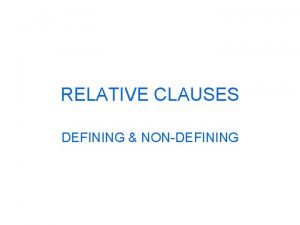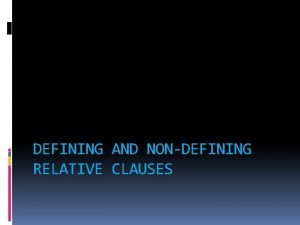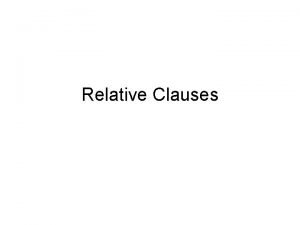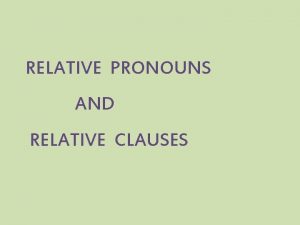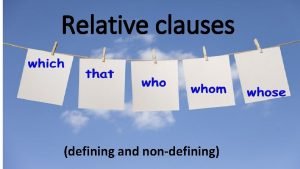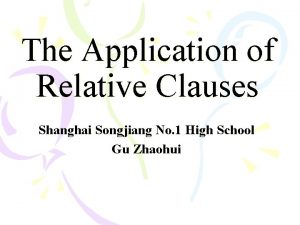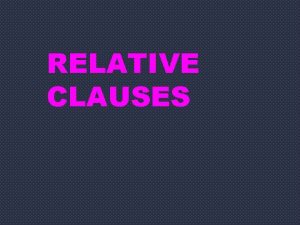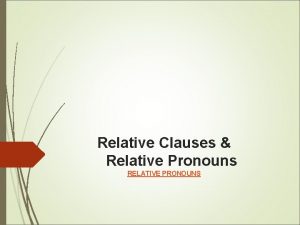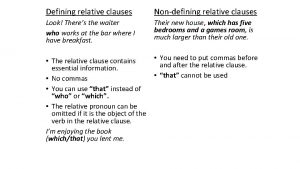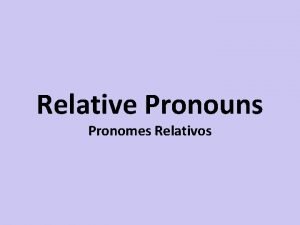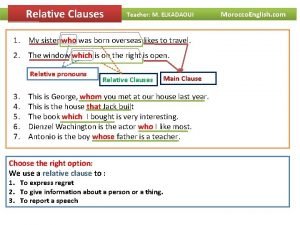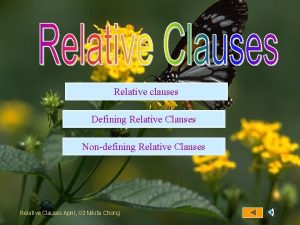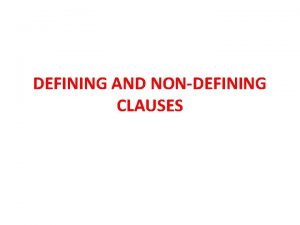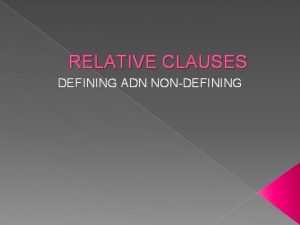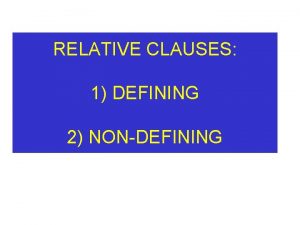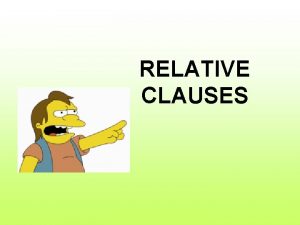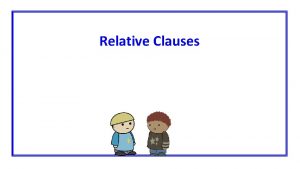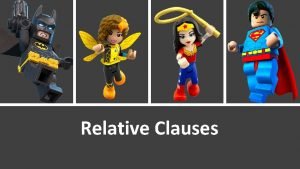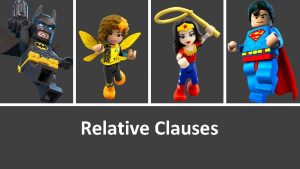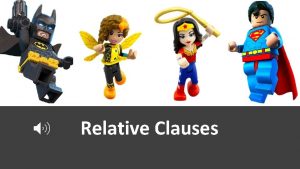Relative clauses defining and nondefining Relative clauses sentences

















- Slides: 17

Relative clauses (defining and non-defining)

Relative clauses/ sentences • Introduced by relative pronouns: WHO, WHOSE, WHOM, WHICH, THAT & relative adverbs: WHERE, WHEN, WHY

Compare 2 types of Relative sentences • a) We stayed at the hotel that Ann recommended to us. • b) We stayed at the Grand Hotel, which Ann recommended to us. • c) Politicians who tell lies are odious. • d) Politicians, who tell lies, are odious. • Defining relative clauses – provide essential information about the subject or object – NO COMMA • Non-defining relative clauses – provide additional information – COMMA – necessary. (THAT – cannot be used) Since the sentence d) “Politicians, who tell lies, are odious”. is a non-defining relative clause (providing additional info), it implies that all politicians are odious (the fact that they tell lies is just an extra info about them). Sentence c) is a defining relative clause, it implies that only politicians who tell lies are odious (those who don’t tell lies aren’t odious).

Relative clauses provide: • I. Essential (defining) information about – (aka Defining relative sentences) • 1. the object • He made me an offer (that) I couldn't refuse. • I invited some girls (whom/that) I’ve known from elementary school to the party. (Who/m did you invite? THEM. – we can use whom) • When the defining relative clause defines an object, the relative pronoun (that/whom) can be omitted.

** WHO VS. WHOM debate • Whom- refers to the object of the sentence -if you can replace the noun or noun clause with him/her/them • Who/whom ate my sandwich? – He ate my sandwich. • Whom did you invite? Them.




Relative clauses provide: • I. Essential (defining) information about – (aka Defining relative sentences) • 2. the subject • A person who never made a mistake never tried anything new. • The reason why I came here today is not important. • The summer when I graduated from university was long and hot. • I met a man whose mother was a pirate. • ** WHOSE – can also refer to inanimate object • I bought a phone whose screen shattered to pieces as soon as I touched it. • Greek Proverb — 'Society grows great when old men plant trees whose shade they know they shall never sit in. '

Relative clauses provide: • II. Non-essential (non-defining) information about: (aka nondefining relative clauses) • **[cannot be introduced with that] • 1. the object • We stopped at the museum, which we had never visited before. • Stratford-on-Avon, about which many people have written, is Shakespeare's birthplace. (preposition before pronoun- formal) • The farmer, whose name was Fred, sold us 10 pounds of old pork.

Relative clauses provide: • II. Non-essential (non-defining) information about: (aka nondefining relative clauses) • **[cannot be introduced with that] • 2. the subject • My cousin, who is a Japanese teacher, lives in Santa Barbara. • 3. the whole sentence ---introduced with WHICH • To calm his angry girlfriend, Joey offered to buy her a diamond necklace, which infuriated her even more. • My friends were all hiding in my apartment, which isn't what I'd expected. • She's studying to become a doctor, which is extremely difficult.

*** Defining or non-defining relative clause***= how to decide which is which (and why it is important to differentiate them)


Learn the difference so you don’t make your girlfriend/boyfriend MAD! • ‘whom I upset’ is a defining relative clause (no commas) meaning there must me more than one girlfriend but just one whom the blue guy upset

Using or not using commas with relative clauses is important if your significant other is grammarsavvy.

• He gave me a letter, which was in a blue envelope. • non-defining clause: There was only one letter; it happened to be blue. You must use which. • He gave me a letter which was in a blue envelope. • defining clause: There were several letters of different colors and he gave me the blue one. Which may be replaced by that. The commas are removed.

COMMAS MATTER!!! • My brother, who lives in Spain, is a student. (I have one brother and he lives in Spain) • My brother who lives in Calgary is a student. (without commas: I have more than one brother) • My dad, who was a cop, would scare off any potential boyfriends. ( without commas: I have more than one dad)
 Non defining clause
Non defining clause Relative clauses defining and non defining
Relative clauses defining and non defining Relative pronouns defining and non-defining
Relative pronouns defining and non-defining Defining and non defining relative clauses in telugu
Defining and non defining relative clauses in telugu Non essential relative clause
Non essential relative clause Defining non defining farkı
Defining non defining farkı Combine the two sentences to one using a relative pronoun
Combine the two sentences to one using a relative pronoun Non-defining relative clauses as sentence modifiers
Non-defining relative clauses as sentence modifiers Nondefining relative clause
Nondefining relative clause Defending and non defining relative clauses
Defending and non defining relative clauses When do we use defining relative clauses
When do we use defining relative clauses Nondefining clause
Nondefining clause Relative clauses and relative pronouns stage 15
Relative clauses and relative pronouns stage 15 Relative pronouns
Relative pronouns Relative clause
Relative clause Non defining relatives clauses
Non defining relatives clauses Non defining relatives clauses
Non defining relatives clauses Defining relative clause worksheet
Defining relative clause worksheet
